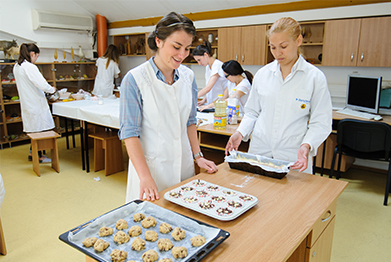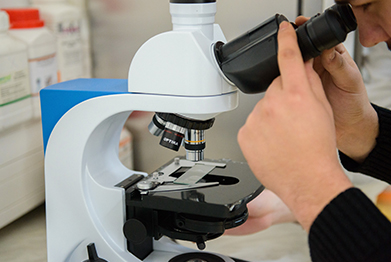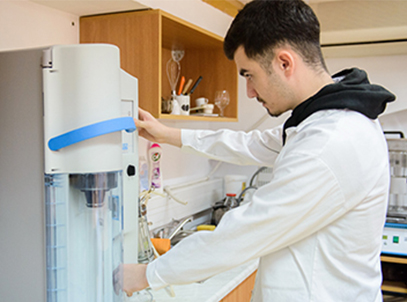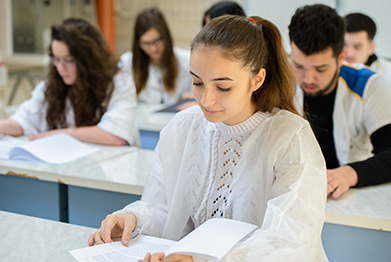Bachelor's degree

The study programme is EUR-ACE labelled.( Details at https://eurace.enaee.eu/node/78607). General presentation: The bachelor's degree programme FOOD ENGINEERING has as general objective the training of technology specialists in the field of food industry. The programme provides complex training of specialists, including training in the fields of biotechnology and bioengineering. The graduates of this study programme possess knowledge that covers the technologies of all sub-branches of the food industry (about 60 specific industries) and thus have the opportunity to work in extremely diverse fields of food production. The duration of the programme is 4 years (8 semesters).
Mission and objectives: The specific objectives are to provide theoretical and practical training for students’ acquisition of knowledge of modern technologies in food production, knowledge and application of measures to increase food quality, design and operation of technological lines for processing agri-food products, analysis, design and application of management in food companies, knowledge and use of specific software, as well as relevant legislation.
Professional skills acquired: - Use and management of advanced technologies in the food industry; - Identification and application of research methods in the field of food science, food technologies, equipment specific to the food industry and biotechnology; - Management of a by-product recovery system, waste treatment and environmental protection; - Design and promotion of food products and application of innovative strategies in the field of food;
- Curriculum
- Syllabus

The study programme is EUR-ACE labelled. (Details at https://eurace.enaee.eu/node/20298).This study programme falls within the field of food engineering. The duration of studies is 4 years (240 ECTS credits). Students will acquire the knowledge necessary to work in the field of food science and safety. Thus, graduates will be able to analyse and design food technologies from raw materials to the finished product; they will be able to implement and monitor food quality and safety management systems; will be able to carry out food control and expertise and consumer protection; they will acquire knowledge on carrying out management and marketing activities in the agri-food chain.
Mission and objectives: The study programme Food Control and Expertise aims to fulfill the mission of training specialists oriented towards food production control, and food control and expertise. The acquired professional knowledge offers graduates the opportunity to work in areas such as technology and control of food production and quality, food control and expertise. In this sense, the curriculum includes, in a logical sequence, disciplines that help the complex training of this specialist (fundamental disciplines - mathematics, chemistry, computer aided graphics, computer programming, field disciplines and general technical culture - general technologies in the food industry, special microbiology, food biochemistry, as well as specialized disciplines - food quality control, instrumental analysis, food expertise and safety etc.).
Studied disciplines: technologies in the field of food production, system design and operation of technological lines for processing agri-food products, analysis, design and application of management in enterprises in the food industry, legislation in the field of food processing
Acquired professional skills: - Identification, description, and appropriate use of the terms specific to food science and food safety; - Supervision, management, analysis and design of food technologies from raw materials to the finished product; - Achievement of the control and expertise of food products, including in the field of consumer protection; - Design, implementation and monitoring of food quality and safety management systems; - Use of basic management and marketing concepts for the food industry.
Perspectives after graduation: specialist engineer in specialized laboratories of production units or control bodies, specialist in consumer protection offices, research in the field of food quality and certification.
Possible occupations for the diploma holder:
Possibilities for further professional development: Undergraduate studies may be continued with master’s studies in the relevant field, for example “Processing Systems and Quality Control of Agri-Food Products”.
- Curriculum
- Syllabus

The study programme is EUR-ACE labelled. (Details at https://eurace.enaee.eu/node/22710). Presentation: This study programme belongs to the field of Engineering and Management, and aims at developing skills in the field of travel and holidays industry (tour operators, travel agencies, travel products, cruises, destinations, etc.) and the hospitality industry (hotels, food establishments public, culinary production, catering, leisure). The duration of studies is 4 years (240 ECTS credits). After graduating from this study programme, the graduates will have the knowledge and skills necessary to work in several branches of tourism: management, hotel equipment, gastronomic engineering, marketing, etc.
Mission and objectives:The objective of the study programme is to train specialist engineers for the hotel industry and public catering units, who should be able to deal in tourist products and services, leisure systems, IT, transport, tourist constructions, etc.
University facilities: Students can benefit from scholarships, accommodation in the dormitories, modern sports facilities, language centre, canteen, etc. They practice and specialize during higher education in universities, research institutes and top companies in the country (Ambient Hotels, Alpin Hotel, etc.) or abroad (Europe, USA, etc.);
Professional skills acquired: - Advanced IT operation skills (computer-aided programming, simulation and design) - Technical assistance, bioeconomic and maintenance of technical systems in all areas of the tourism industry; - Management and marketing in the tourism industry, which enables setting up business and attracting project-based funding; - Multilingual communication; - Obtaining pedagogical qualification to teach in high school and higher education; - Research competences; - Ecological education on the quality of tourism products and services, as experts in environmental impact issues.
Perspectives after graduation: Graduates can hold technical and managerial positions with travel agencies, tour operators, hotels and catering, transport and leisure in the tourism industry, Info-centres, research, education, local or central administration, etc.
Possible occupations for graduates: -manager in the area of travelling, - director of travel agency, - hotel manager, - restaurant manager, - head of pension, - head of cottage, - head of hotel supply, restaurant, - head of tourist transportation agency, - head of tourist marketing office - head of investments, constructions, architecture; head of hotel reception; restaurant manager (maître d’hotel); technologist in public catering; head of tourist information centre; travel guide; administrative functions in central and local tourism bodies; tourist animation manager; teacher and researcher, etc.
Possibilities for further development: Graduates of this study programme can attend a master's degree programme at the Faculty of Food and Tourism, Hospitality Management and eco-tourism, at the end of which they can opt for enrollment for doctoral studies in the field of Engineering and management.
- Curriculum
- Syllabus

The study programme is EUR-ACE labelled. (Details at https://eurace.enaee.eu/node/78603). This study programme belongs to the field of engineering and management in agriculture and rural development. The duration of studies is 4 years (240 ECTS credits). After graduating from this study programme, graduates will be able to draft and interpret the technical, economic and managerial documentation of public catering, agritourism and tourism. Students also gain knowledge on the planning of flows, processes and technical, economic and financial systems in public catering and agritourism units. The study programme aims to develop specific and complementary skills in future specialists, by providing the necessary knowledge for research, production, and administration in the field of public catering units, pensions and agritourism farms in the global context of nature-orientated tourism and capitalization of resources in the rural and natural space, based on ecological principles.
Professional skills acquired: - Drafting and interpretation of technical, economic and managerial documentation of public catering, agritourism and tourism enterprises; - Carrying out applications to solve specific tasks of engineering and management in the field of agritourism, based on knowledge in fundamental and engineering sciences; - Planning the flows, processes and technical, economic, financial and socio-cultural systems in the public catering and agritourism units; control and evaluation of these activities; - Management of information systems: software applications - operation and control, based on field-specific indicators; - Management of production units / services in public catering and agritourism and marketing strategies and policies in the field; - Designing new products and services; quality control and audit of new production / service provided;
University facilities: Students can benefit from scholarships, accommodation in dormitories, modern sports facilities. They can perform internships during university studies in universities, research institutes and companies in the country (ARO Palace SA, Metropolitan Agency for Sustainable Development Brasov, SC Edelweiss Poiana Hotels SRL, SC Vimmy's Corner SRL, SC Chianti SRL, Pension Lacul Mocearu, Hotel - Restaurant Albert / SC Monumental High Business SRL) or from abroad (Job Trust, Algoos Work and Travel - through the Erasmus + programme).
Perspectives after graduation: tourist boarding house manager, small business manager - owner (guarantor) in hotel, restaurants and tourism, entrepreneur in social economy, event manager/ banqueting department, catering technologist, head of department / service (logistics, marketing, supply-sales), tourism analyst, high school, post-high school, professional and foreman teacher, director of agricultural company, travel guide, etc.
- Curriculum
- Syllabus